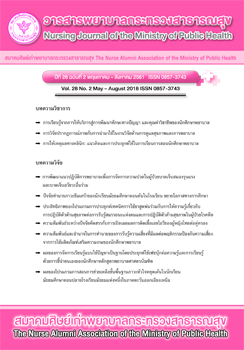The Application of a Phenomenographic Approach in Healthcare and Nursing Research
Main Article Content
Abstract
Abstract
Phenomenography is a qualitative research approach that is useful for exploring variations of conception encompassing the phenomena of human experience in the world. This approach has often been applied in research studies in the area of education, economics, and healthcare research. Although the phenomenographic approach is conducted quite widely, there is a little research
study using this approach in Thailand, especially in the area of healthcare and nursing research. The purpose of this paper is to explain what phenomenography is and how this qualitative research method can be used in the areas of healthcare and nursing research. The phenomenographic method can be used to clarify the perspectives of clients, caregivers, and healthcare professionals of how they experience and perceive a phenomenon in which they are interested in. Therefore, the phenomenographic approach can be considerable for the development of knowledge for practice-based approaches to health care for clients.
Article Details
บทความและรายงานวิจัยในวารสารพยาบาลกระทรวงสาธารณสุข เป็นความคิดเห็นของ ผู้เขียน มิใช่ของคณะผู้จัดทำ และมิใช่ความรับผิดชอบของสมาคมศิษย์เก่าพยาบาลกระทรวงสาธารณสุข ซึ่งสามารถนำไปอ้างอิงได้
References
1. Pherali TJ. Phenomenography as a research strategy. Germany: Lambert Academic Publishing; 2011.
2. Limberg BL. Phenomenography. In: Given Lisa M editors. The Sage encyclopedia of qualitative research methods. Thousand Oaks: SAGE Publications; 2008.
3. Marton F. Phenomenography? describing conceptions of the world around us. Instructional Science.1981;10(2):177–200. doi:10.1007/bf00132516
4. Hasselgren B, Beach, D. Phenomenography-a “good-for-nothing brother” of phenomenology? Outline of an analysis. [Internet].2006 [cited 2017 January 12];16(2):191-202. Available from: https://www.tandfonline.com/doi/abs/10.1080/0729436970160206?journalCode=cher20.
5. Larsson J, Homlmström I. Phenomeno graphic or phenomenological analysis: does it matter? Examples from a study on anaesthesiologists’work. International Journal of Qualitative Studies on Health and Well-being. [Internet]. 2007 [cited 2017 December 20]; 2:55-64. Available from : file:///C:/Users/Administrator/Downloads/17482620601068105%20(2).pdf
6. Richardson John TE. The concepts and methods of phenomenographic research. Review of Educational Research. [Internet].
1999[Cited 2017 February 4];69(1):53-82. Available from: http://www.cedu.niu.edu/~walker/research/Phenomenology.pdf
7. Lennart S. Theoretical foundations of phenomenography. Higher Education Research & Development. [Internet].1997[cited 2016 February 19];16(2):159-71. Available from: https://www.tandfonline.com/doi/abs/10.1080/0729436970160204
8. Sin S. Considerations of quality in phenomenographic research. International Journal of Qualitative Methods. Internet].2010[cited 2017 April 19];9(4):305-19. Available from: http://journals.sagepub.com/doi.pdf/10.1177/160940691000900401
9. Sandberg J. Understanding human competence at work: an interpretative approach. Academy of Management Journal 2000; 43(1):9-25.
10. Marton F, Booth S. Learning and awareness. Mahwah, NJ: Lawrence Erlbaum and associates; 1997.
11. Barnard A, McCosker H, Gerber R. Phenomenography: A qualitative research approach for exploring understanding in
health care. Qualitative Health Research. [Internet].1999 [cited 2017 April 19] Available from:http://journals.sagepub.com/doi/pdf/10.1177/ 104973299129121794
12. Photisita C. Science and art in qualitative research. 3rd ed. Bangkok: Amarin Printing and Publishing; 2007. (in Thai)
13. Kärner A, Dahlgren M, Bergdahl B. Coronary heart disease: causes and drug treatment–spouses’ conceptions. Journal of
Clinical Nursing. [Internet].2004 [cited 2017April23]Available from: https://onlinelibrary.wiley.com/doi/pdf/10.1046/j.1365-2702.2003.0087.x
14. McCosker H, Barnard A, Gerber R. Phenomenographic study of women’s experiences of domestic violence during the childbearing years. Online Journal of Issues in Nursing. [Internet].2003. [cited 2018 July 14]. Available from:http://nursingworld.org/ojin/topic17/tpc17_6.htm
15. Manasatchakun P, Roxberg Å, Asp M. Conceptions of healthy aging held by relatives of older persons in Isan-Thai
culture: a phenomenographic study. Journal of Aging Research. 2018;1-9.
16. Yates C, Partridge H, Bruce C. Exploring information experiences through
17. phenomenography. Library and Information Research [Internet]. 2012 [cited 2018 January 21]. Retrieved from: http://www.lirgjournal.org.uk/lir/ojs/index.php/lir/article/view/496/552
18. Limberg BL. Phenomenography. In: Given Lisa M editors. The Sage encyclopedia of qualitative research methods. Thousand Oaks: SAGE Publications; 2008.
19. Sandberg J. Are phenomenographic results reliable. Higher Education Research & Development.1997;203-212.doi:10.
1080/0729436970160207
20. Marton F. Phenomenography—a research approach to investigating different understandings of reality. Journal of Thought.1986; 21:28–49.
21. Åkerlind G. Learning about phenomenog raphy: interviewing, data analysis and the qualitative research paradigm. In : C
Boowden, J Green P, editors. Doing developmental phenomenography. Melbourne: RMIT university press; 2005.

